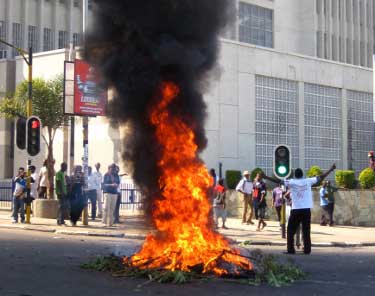In the past, Malawi has affectionately been known as the “warm heart of Africa.” Over the last week, however, headlines have popped up indicating that recent unrest has turned Malawi upside down. So what exactly is happening in this typically friendly nation?
Stuart Palmer, CURE International executive director for CURE Malawi, says there is more than meets the eye with the recent violence that caused Malawi to take a place on international maps.
Despite rumors that protests turned deadly when government officials fired live ammo above an innocent crowd, Palmer says he hasn’t felt threatened. “It hasn’t been a terrible experience, what’s happened in the last week in Malawi,” says Palmer. “There’ve been many storm clouds building up to what happened over the last week.”
The would-be peaceful demonstrations that went awry last week took place after many months of waiting on the Malawian president. “Increasingly, ordinary people have become frustrated by the unwillingness of the current president to listen to their perfectly reasonable concerns,” explains Palmer.
Malawi is known for its friendliness in Africa, but the poor nation is still filled with many uneducated and unemployed citizens. As a result, it’s difficult for the general populous to hold the government accountable, says Palmer. The current president has, in the eyes of many citizens, taken advantage of his position by using his previous success as an excuse to cease listening to his people now—a people who have been beleaguered by outrageous fuel prices and a difficult exporting situation for months. (Listen to the full interview with Palmer for more details on the economics of the situation.)
Palmer explains: “All that’s happening at the moment is [citizens] are just expecting a little bit more engagement in the way that [the president] leads the country. They want more engagement with economic issues, more engagement with freedom of speech issues and more engagement politically.”
Tired of waiting and hurting in the process, people took to the streets of cities across Malawi to peacefully protest. A petition was signed giving the president until Aug. 17 to make headway on the desired changes.
In the midst of such a widespread demonstration, however, some were determined to make other uses of the platform. Palmer says unrest stemmed from a group with an entirely different agenda than the protesters.
“Although there was some unrest in the last week, it was really a criminal minority that was taking advantage of a peaceful demonstration, using it really as cover to do some extremely organized looting,” says Palmer, who had been riding his bike following the protest which happened nearest him.
Reportedly, officials opened fire on civilians as a result of the unrest. Palmer says it’s hard to know what exactly went on or who’s to blame, but the event has been sensationalized: the nation has not been turned on its head just yet.
Still, 18-20 lives were indeed lost, and the CURE hospital itself suffered. “We’ve had a 50 precent drop-off in our patients coming from around the country,” comments Palmer. This means fewer people getting orthopedic surgery and fewer people seeing the gospel lived out by CURE staff.
But is Malawi really in major danger? Are its citizens afraid for their lives? It does not seem so. Ultimately, Palmer says, Malawi is still a friendly, peaceful nation. Yet if the president doesn’t respond soon, protests may again get out of hand.
“I think the lesson has to be: if you don’t give people any way of talking to you, of communicating to you, then eventually the frustration will build up. And people do find a way—some way, somehow—to give vent to their dissatisfaction. The more you let it build up, the harder it is to control how it comes out.”
For now, Malawi seems to have settled down, but Palmer adds this plea: “Pray that there is some material change in the dialogue that’s happening between now and the 17th of August. Otherwise, there will be further demonstrations held and possible further loss of life.”
See an error in this article?
To contact us or to submit an article





















